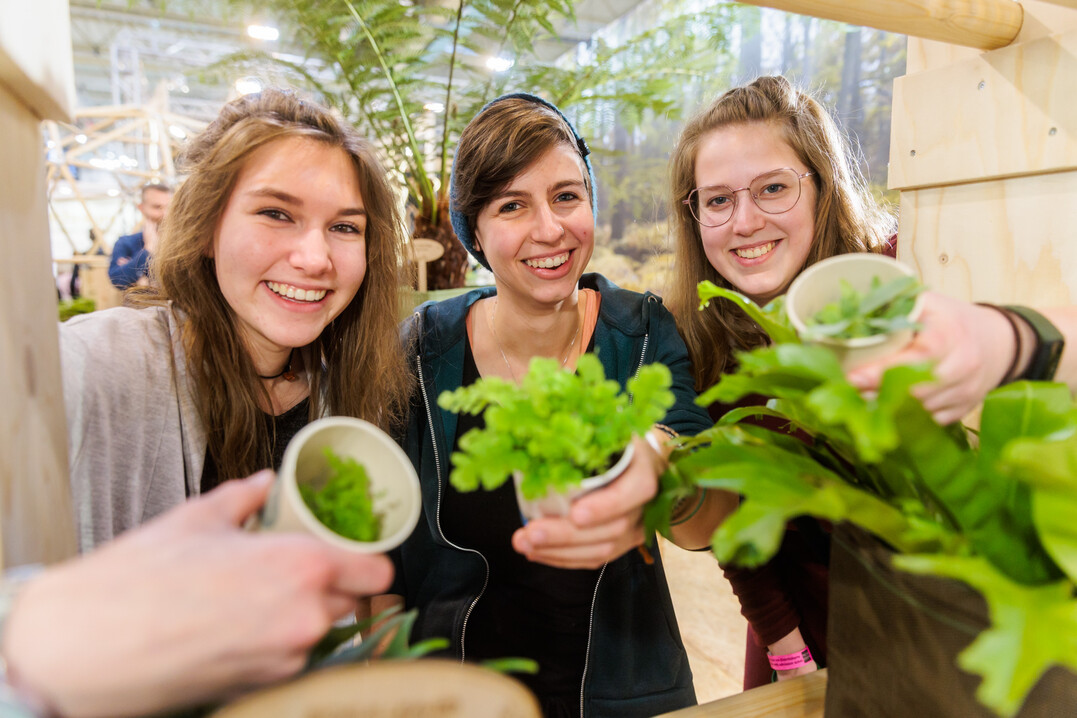+ + + There are many good reasons for flowers and plants
Despite a challenging environment, the garden market proved to be quite stable last year compared to other sectors. Despite the energy crisis and consumer caution among customers unsure about inflation and politics, the declines predicted in advance did not materialise as much as feared. This gives confidence for 2024.
- Veröffentlicht am

The growing interest in gardens and greenery in general is recognisable, as is an increasing awareness of the importance of nature and green spaces for health and well-being. More and more people are recognising the benefits of gardening, whether as a hobby or to grow their own food.The current "Industry REPORT Garden Living, Gardening and Living Green - Prospects up to 2030" predicts that the German garden market will develop significantly better than the long-term trend, provided that the target group's favourite sources of communication and information can continue to be used and consumers remain enthusiastic about flowers and plants. Current studies promise that this can be achieved.
More time in the garden
Even after the coronavirus pandemic, consumers are still interested in flowers and plants and, according to a survey by power tool manufacturer Stihl, are spending more and more time in the garden. It is interesting to note that this observation was made primarily among younger garden owners. The reason given by the majority for spending more time in their own garden is that they see the garden as a place of relaxation and tranquillity and enjoy being together with friends and family. In the study, many say that they want to spend time in nature or get creative and realise projects themselves.
Gardening for my life
Einhell's Do-It-Yourself Study 2023 analysed consumer behaviour in their own four walls and in their own garden. The key finding is that more than two thirds of respondents agree with the statement "I like gardening for my life". According to the study, the main motives for this activity are independence, relaxation, self-realisation and self-affirmation.
Healthy snacking is booming
Edible plants continue to be a big hit. Vegetables and herbs that grow reliably and produce a tasty yield are still very popular with hobby gardeners. The trend towards self-sufficiency is unbroken, as long as the plants are flavourful and aromatic.According to specialist retailers, sales of these vegetables are stable to rising. In 2023, for example, increases of 10 % were often recorded for this range compared to 2022. The increases were often due to higher-quality varieties or larger pots.
Strong products for a strong market
Innovations in the plant market will once again be presented at IPM ESSEN. "Green climate heroes" are plants that cope particularly well with drought, heat and heavy rainfall. The issue of climate change has become noticeable after another hot summer. According to analyses by the German Weather Service, the summer of 2023 was too warm on average for the 27th time in a row. To put it bluntly, this means that a person under the age of 30 has basically never experienced a "normal" summer. Accordingly, according to a study by Stihl AG, the issue of drought is already an important topic for consumers. The majority take the issue into account when selecting new plants, some of them even strongly or very strongly.
Native wild perennials and native woody plants as well as natural-looking plantings with a meadow character are attracting attention, according to trade experts. It has been observed that more and more consumers are prepared to organise their gardens in a more natural way. At IPM ESSEN, solutions will be offered with perennial plant combinations that offer ecological added value for the preservation of biodiversity and at the same time thrive in gardens and cities.
Easy to care for and bee-friendly
Easy care and bee-friendliness are requirements that customers are increasingly demanding at the point of sale. Plants should often be robust and, if possible, prevent the ongoing extinction of species. For example, "Insect joy with regional wild plants", a project in the Federal Biological Diversity Programme, is an important component in promoting regional wild plants and transforming gardens and green spaces into more biodiversity. The new products are often incorporated into promising concepts: What all concepts have in common is that they make consumers strikingly aware that they can make their own small personal contribution to climate and nature conservation with living greenery and are offered ready-made solutions.
Ecosystem services are becoming more important
Futurologist Max Thinius attributes an increasingly important role to the garden. In his view, plants and gardens are important for both the environmental climate and the social climate. The ecosystem services provided by flowers and plants are a topic for the future that the German government has recognised as worthy of funding.At the association congress of the Federal Association of Garden, Landscape and Sports Field Construction in late summer 2023, politicians once again emphasised the importance of urban greenery. The aim is to make cities more climate-resilient in the future. As a result, more and more cities are significantly expanding their budgets for planting trees in the city. The so-called "tiny forest", in which many trees are planted in a small area in the city centre, is just one of many manifestations of the growing importance of greenery in the city. At times, the question arises as to how the increased demand for trees and shrubs can be met.
With the INUGA project, the Federal Ministry of Food and Agriculture has published the "Announcement on the promotion of innovations in urban horticulture" as part of an innovation programme. The aim is to strengthen the horticultural sector as an economic sector in general and with regard to its contribution to green infrastructure, sustainable plant production and social aspects in urban areas. As a result, twelve forward-looking collaborative projects have been set up with a total of 31 private companies and research institutions involved, which are researching various issues relating to urban horticulture. The project will be present at IPM.
More and more digitalisation and smart gardens
The trend towards digitalisation in the home garden is advancing in parallel with the move towards near-natural gardens. This includes smart gardening solutions. Automatic watering systems and robotic mowers are particularly popular.
Purchasing power: less money is available
Regardless of the importance and relevance of flowers and plants, the question is to what extent consumers can afford flowers, plants and other horticultural products in times of inflation and crisis.
Despite rising wages, the purchasing power of Germans is falling, according to analyses by the Institute of Economic and Social Sciences (WSI). The result is a decline in average real wages in Germany. Apparently high wage increases are being cancelled out by the cold progression. The mood is still characterised by uncertainty and worry, which is putting the brakes on carefree consumption.
The poor consumer sentiment in Germany was reflected in online retail in mid-2023. There, sales in the first half of 2023 fell significantly below the level of the first half of 2022. However, if you compare the figure with the entire half of 2019, i.e. with figures before the coronavirus pandemic, you realise that the supposedly poor figures for 2023 are well above the standard.
Brick-and-mortar retail is not dead
In view of the weakening online sales, it is interesting to look at how sales in bricks-and-mortar retail are developing. Although sales in DIY and specialist garden centres (DIY sector) fell slightly by the end of the third quarter of 2023, the declines are not on the same scale as those in other sectors. The green sector is quite stable.According to industry experts, many consumers spent their holidays at home on their balcony or in the garden again in 2023, which benefited the stationary garden centre. The analysis of average receipts in specialist retail confirms this assumption. The purchase amount per customer increased in the summer months, although customer frequency decreased.
Brick-and-mortar retail is far from dead - even if this is often prophesised.According to a recent household survey by Konzept & Markt GmbH, the topic of sustainability is relevant for eight out of ten garden centre customers, but is clearly behind quality and value for money as a decision criterion when making a purchase. According to GfK research, inflation is currently putting a significant brake on sustainable consumption. Half of the respondents in a study stated that they could not afford sustainability, compared to only a third in 2019. It is clear that sustainable consumption is increasingly becoming a question of income. In addition, two thirds of consumers do not want to do without a certain level of comfort despite their ecological awareness.
Change in the flow of goods is recognisable
AMI's new product flow analysis describes the marketing channels for flowers, ornamental plants and woody plants. It is very interesting to note that the flow of goods is becoming increasingly dynamic. Increasingly, bulk consumers, retailers, service providers in the gala construction, cemetery construction and interior greening sectors, as well as end consumers, are organising the procurement of their flowers and plants differently. They are increasingly focussing on direct imports or shortening the supply chain.
Cocooning is strong again
Retail experts assume that consumers will focus even more on their own four walls in 2024 due to uncertain global politics, accompanied by energy cost increases and rising inflation. The cocooning effect is back on the starting blocks, although the market for garden plants will no longer grow in the same way as in the last three years due to the garden projects that were largely completed during the pandemic. Nevertheless, it is clear how important living greenery is to consumers, especially in times of crisis, even when budgets are tight.
Minimum wage continues to rise
The sector is somewhat concerned about the development of labour costs. After several increases in the statutory minimum wage in recent months, the wage rose again on 1 January 2024 and then again in 2025.These wage increases will pose challenges for many companies in the horticulture sector. In view of the considerable competitive pressure from abroad due to plant imports, rising labour costs will increase the risk of a lack of competitiveness.
"Confidence is an entrepreneur's duty!"
Regardless of how costs will change in 2024, it is important to seize the opportunities that horticulture offers with confidence. The opportunities are numerous if you look at 2023 alone and see that topics such as "Barbie" or digitalisation are surprisingly inspiring customers.
Society has become aware of the climate crisis and extreme weather events. Measures to protect the climate and the environment are opening up new opportunities and marketing potential for horticultural products.The relevance of flowers and plants for the population is and remains high.Horticulture sells emotions and ecosystem services - coveted products with great significance. The sector should clearly demonstrate this to consumers!
Andreas Löbke, CO CONCEPT, on behalf of Messe Essen for IPM ESSEN 2024



Zu diesem Artikel liegen noch keine Kommentare vor.
Artikel kommentierenSchreiben Sie den ersten Kommentar.